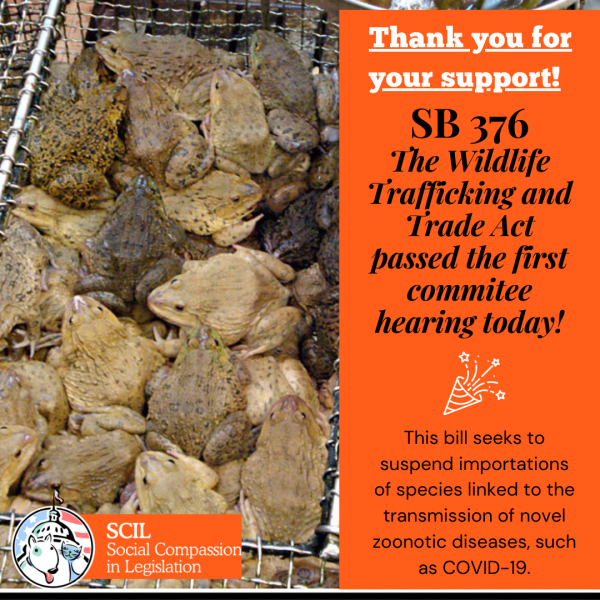
SB 376, The Wildlife Trafficking and Trade Act, will take several critical steps to address zoonotic diseases and invasive species
SACRAMENTO, CA – Today, SB 376 The Wildlife Trafficking and Trade Act passed the Senate Natural Resources and Water Committee with overwhelming support with a vote of 7-0. The bill was introduced earlier this year by Senator Henry Stern (D-Los Angeles), along with cosponsors Social Compassion in Legislation and The Center for Biological Diversity, and seeks to address the underlying cause that led to the emergence of the COVID-19 pandemic by reducing the risk of zoonotic transmission. This bill sets out several provisions to tighten import permitting of wild animals. If passed, it will also limit the sale of live animals for human consumption that are known to have zoonotic disease or be an invasive species.
“The wildlife trafficking industry is not only a multi-billion dollar global black market, but also a major risk to public health,” said Senator Stern. “COVID-19, like SARS, MERS, and Ebola, originated from animals, and this zoonotic disease transmission risk is why we need to pass SB 376 this year.”
Approximately 60% of infectious diseases are considered zoonotic, meaning they jump from other animals to people, and more than 70% of zoonotic diseases originate with wildlife. COVID-19 almost certainly originated in a bat, likely made the jump to another species, potentially a pangolin, and from there to humans. The COVID-19 pandemic illustrates how important it is to fully evaluate the risks those animals pose. In addition to the threat to human health, native wildlife is also impacted. If passed, this bill will enable California to take the lead in protecting its residents and our state’s native species by regulating the importation of wildlife.
The COVID-19 outbreak has led numerous organizations, including elements of the UN and WHO to call for bans or restrictions on the live wildlife trade. Consistent with these international efforts, this bill would require the California Department of Fish and Wildlife (CDFW), in consultation with the California Department of Public Health (CDPH), to suspend importation of species linked to the transmission of novel zoonotic diseases. CDFW’s permitting for individual wild animals carrying disease is clarified to authorize imports into the state only where testing and treatments, including quarantine, are available. This bill also bans the sale of live frogs, turtles, and non-poultry birds for human consumption if these animals are found by CDFW to be invasive species or carry zoonotic disease.
“When animals are held captive and taken from their native habitat, there are bound to be consequences,” said Judie Mancuso, CEO and founder of Social Compassion in Legislation. “Not only are they suffering, but they pose a risk of zoonotic spillover. If this pandemic has taught us anything, it is just how catastrophic the consequences are, which means we have no time to waste in enacting this bill. We are thrilled it passed unanimously, as The Wildlife Trafficking and Trade Act will protect not only us, but our state’s native species as well.”
“The international wildlife trade poses a dire threat to the world and California’s biodiversity, as well as to our public health, and by extension our economy. Not only is wildlife trade one of the primary drivers of the extinction crisis, it likely precipitated the COVID-19 pandemic that has killed over 60,000 Californians,” said Brenden Cummings, the Conservation Director of the Center for Biological Diversity. “By placing commonsense and precautionary restrictions on wildlife imports, this bill will greatly reduce the chances of California becoming the source of the next pandemic.”
The bill now moves to the Senate Public Safety Committee and will be heard later this month.